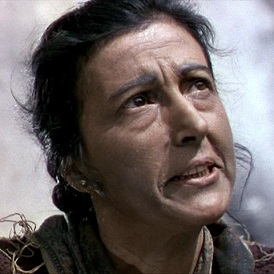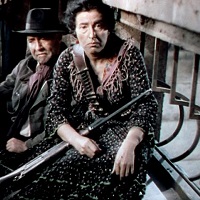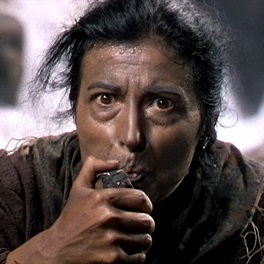Nick-Davis.com: Supporting Actress Calendar by Month












Browse Films by
Title /
Year /
Reviews
Home /
Blog /
E-Mail
|
Nick-Davis.com: Supporting Actress Calendar: February Index
← February 2016 →
1
2
3
4
5
6
7
8
9
10
11
12
13
14
15
16
17
18
19
20
21
22
23
24
25
26
27
28
29
|
Katina Paxinou, For Whom the Bell Tolls
1943: winner |
|
4 |
★ ★ ★ ★ ★
It is not Katina Paxinou's fault that Sam Wood's For Whom the Bell Tolls understands Spanish Republican resistance fighters entirely through the lens of fiery folksiness and colorful "ethnicity," or that nobody can decide what hue or amount of shoe polish or Fuller's earth to smear across her face from scene to scene, so a Greek actress might pass for a Spanish woman (??). It is also not her fault that chunky soliloquies consume so much of her character's considerable screentime, whether on Pilar's self-perceived ugliness or on the nauseating moment when a principled uprising of the disempowered became a violent mob in its enemies' image. Wood has no idea how to stage dramatic asides—Ingrid Bergman at one point delivers an apostrophe into the side of a horse—and because Pilar shoulders so many of these, Paxinou is hemmed in by the shakiest habits of an already-bad director.
However much blame belongs elsewhere, you cannot change what's on screen, which often suggests Anna Magnani's sterner, stiffer-jointed sister playing Cold Mountain's Ruby Thewes. Preceded on screen by Pilar's reputation for steely authority and grandness of spirit, Paxinou hawks these ideas in a pose-striking way, seldom folding them into a plausible characterization. "I've heard you are much woman" is the first thing she hears from Gary Cooper's Robert Jordan (one of the sleepiest performances ever nominated for Best Actor), and Paxinou leans into that muchness, especially in full shots: strong back, sharp elbows, lusty voice, head cocked back in mirth or forward with resolve. She does better in close-up, conjuring believable anger at a probable traitor or dismay at undisciplined comrades. Still, Paxinou's Pilar does not persuasively project leadership; she and the film bullishly promote a hoary, thick-lined, accented idea of the earth mother-as-platoon sergeant and hope that's enough. She is frontally showcased in several scenes, exhibited for voters while addressing her fellow guerrillas. Then again, Wood's blocking turns on her for long periods, keeping her back to the camera while some other dubious performance gets the spotlight. Paxinou tries to convey a natural leader in a film saddled with a hopeless one. I'm as reluctant to blame her as I am to co-sign her victory. Leave a Comment |
 |
 |
 |
 |
|













